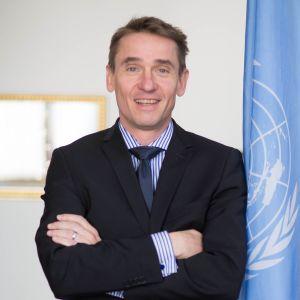It is entirely appropriate that this year, we are focusing on the environment.
Yesterday, while we were enjoying yet another stunningly warm autumn day, one of my friends remarked on the irony of it, the day before organizing our UN Day event on the environment.
Today’s beautiful October day is not disconnected from what we are doing to our planet. Think about that, please, every time you enjoy a coffee outside.
Globally, as you all know, the last 5 years are the hottest on record. In Albania too – the last years are the hottest on record. Take a look at the screen behind me – from a global initiative called #showyourstripes. It dramatically displays the acceleration of the hyper-heating of our planet specifically on Albania.
We know from Albania’s official communications to the United Nations Climate Conference that scientists predict hotter weather, especially in summer. Precipitation will be generally reduced, with the remaining rain falling in more intense bursts, bringing with it higher risks of floods. And they predict more frequent droughts, bad for agriculture, bad for hydro-power.
The climate crisis is why this year the Secretary-General of the United Nations convened a high-level summit in September, and asked nations not to come with pretty words, but with lists of concrete actions.
The good news is that Albania has a wonderful starting point.
It has many natural resources that make the country beautiful to live in for its citizens, and which, if used sustainably, can contribute to Albania’s development for generations to come.
The electricity that Albania produces is entirely carbon-free (except when the dams are dry and Albania buys electricity off the market). And Albania’s sunshine is a solar-energy resource with great potential.
The Government is conscious of its obligations – for its citizens – and as a global citizen.
For example, in 2016, a moratorium on logging was enacted to start reversing the drastic deforestation that has occurred in Albania over centuries. In early 2019 it issued a national forestry plan. And just ahead of the UN’s climate summit this year, Albania produced its first climate change strategy, also a first for the Western Balkans. The Ministry has recently launched an initiative to ban plastic bags – I am sure the Minister will say more. And as you just saw in the video, the Prime Minister has committed to achieving carbon neutrality by 2050.
However, there is no time to lose. Plans and laws need budgets and staff, or else they will have no impact.
In fact, what is really needed is an overall budget analysis that can help create what we might call an “SDG investment plan” – so that Albania’s citizens can see how the Government intends to invest in the full range of SDGs – from social protection to health to education to the environment.
And speaking of the SDGs…
As you know, it has been underlined since the inception of Agenda2030 that the SDGs are mutually reinforcing; they have linkages with one another; you cannot tackle them alone.
This is certainly true of the environment, and I want to give an example, which is the idea of “environmental justice.
The concept of “environmental justice” highlights how the environmental SDGs – let’s say SDG 13 Climate Change, or SDG 15 protecting “Life on Land” – are linked to SDG 16, building accountable institutions. “Environmental justice” is the connection between protecting the biodiversity in Albania’s rivers and forests, and the rule of law and democracy. It is the connection that says the resources of Albania belong to the people of Albania, and it is government’s job to manage those resources on behalf of its present – and future – citizens.
In practical terms, what does environmental justice mean? It means that the best possible science is used to prepare environmental impact assessments, and that those assessments are transparent and available for public debate. It means that parliament creates forums to consult the residents and municipalities that have the local knowledge. It means that professional consultations are undertaken with the communities whose villages or farms might be affected for decades to come. It means that the courts – and allow me here to recognize once again what I believe is the positive and valuable judicial reform process – are making judgements based solely on the law and on the well-being of Albanian citizens.
In sum, if Albania is to move quickly and sustainably to protect its resources, then along with all the other judicial reforms, environmental justice is needed too.
And this is just one example of the inter-connectedness of the SDGs.
Overall, development progress needs to be made on different fronts: governance and democracy, the economy, investments in people and planet – all at the same time to create a positive, virtual cycle.
The United Nations team in Albania is proud of our partners and our work, we are unabashedly optimistic about Albania’s future, and we are energized every day to try and make that virtual cycle spin faster.
Thank you.












